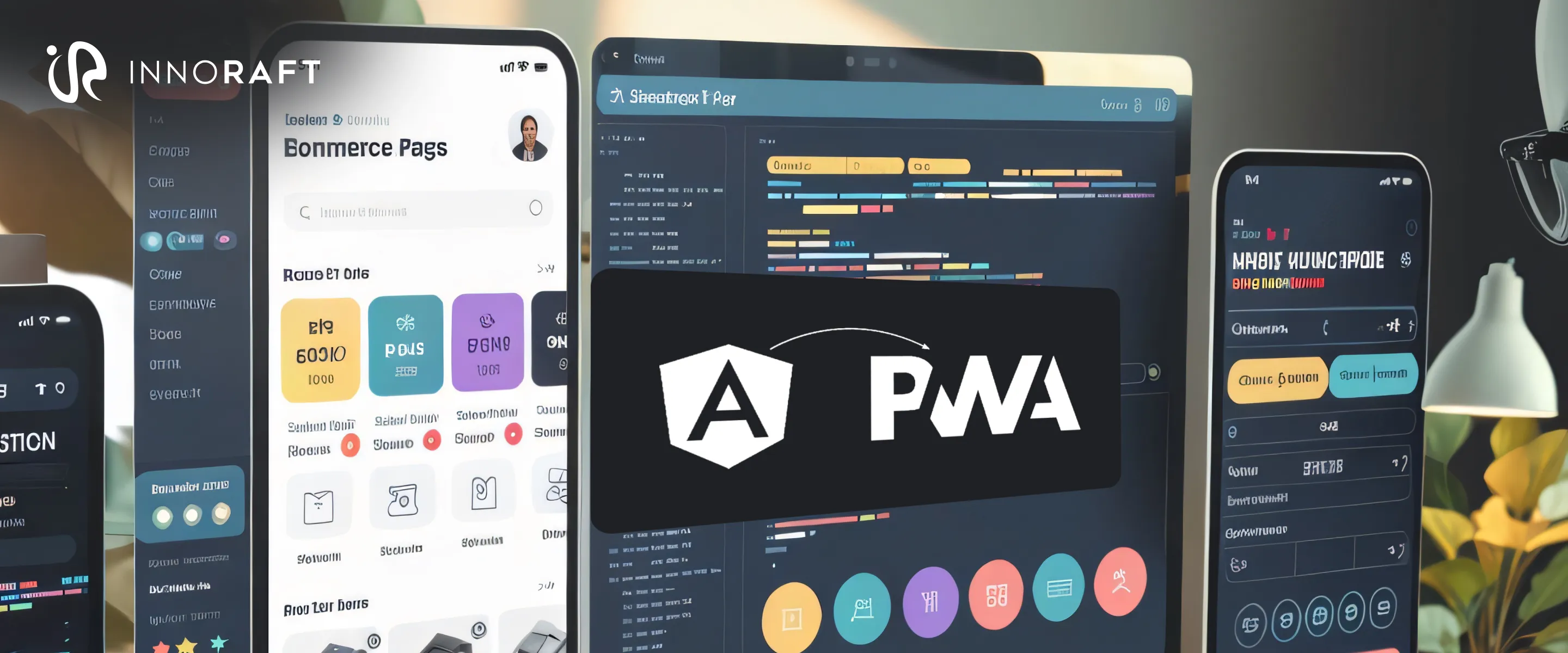User experience is central to the success of any digital solution, and Progressive Web Apps (PWAs) have transformed how businesses deliver web experiences. By incorporating the best features of mobile and web, PWAs offer fast, reliable, and engaging interactions directly from the browser.
For businesses exploring this approach, the key question becomes: “What’s the best way to build a PWA?”
The answer lies in Angular PWA. As one of the most robust frameworks, Angular simplifies the creation of scalable, high-performance applications. With Angular, you can deliver seamless web experiences that rival native apps—without the added complexity of separate mobile development.
Why Angular is an Excellent Choice for Creating PWAs?
So, why should you utilize Angular PWA for your next project? Since Angular is a scalable, accessible framework, it is designed to make complicated tasks simple.
Here's why Angular is the best choice for designing PWAs.
Built-in PWA Capability
One of the key benefits of utilizing Angular progressive web app development is its integrated PWA support. Angular development includes pre-configured settings for features such as service workers, making it easy to convert a conventional web app into a PWA with specific commands. This eliminates the need for developers to design these capabilities from the start, decreasing project time and complexity.
Performance and Scalability
The architecture of Angular is designed to scale. With Angular PWA performance optimization, you can keep performance without sacrificing codebase control, whether you're developing a basic web application or a comprehensive enterprise solution. This implies that you won't have to constantly redevelop your PWA as your business expands.
Modular Design for Simple Maintenance
The modular structure of Angular ensures that your application can be maintained even as it becomes more complex. Your app can be built in separate, reusable modules, which simplifies and expedites the process of adding new features or updating existing ones. This reduces future maintenance hassles for businesses.
Smooth User Experience Across All Devices
Angular's robust architecture ensures that your PWA provides a seamless, responsive experience on all devices. Whether users are on a desktop or a mobile device, they will experience the same quick, reliable engagement, which is crucial for businesses looking to retain customers and expand their digital footprint. This functionality also makes Angular an ideal alternative for businesses that provide mobile app design services.
Security and Testing Tools
Using built-in security features and testing tools, Angular enables you to create a PWA that not only performs well but also protects data and is reliable. This renders Angular a reliable framework for businesses that handle sensitive data or crucial customer interactions.
With Angular providing a solid foundation, it's critical to understand the key features that make a PWA effective.
The Essential Features of a PWA
When developing a PWA, comprehend the fundamental features that enable quick, reliable, and engaging experiences across different devices.
Here are the key features that every PWA should have:
Service Workers
Service workers are scripts executed in the background of a web app to enable features such as offline access and background synchronisation. With service workers, your application can keep working even if users lose connectivity, ensuring a seamless experience.
Performance Optimization
Angular divides the application into several sections when using lazy loading. Because less code needs to be loaded up front, performance is improved, and initial load times are decreased by only loading the code required for the current view. Applications benefit from pre-compiled templates and become reliable with Ahead-of-Time (AOT) compilation. It speeds up user interaction by reducing runtime processing. To get rid of unnecessary code, use tree-shaking during the build process. It can reduce the application size.
Application Shell
PWAs employ an app shell architecture to ensure that the app's core framework loads rapidly, irrespective of the user's connection speed. The app shell is the very minimum of HTML, CSS, and JavaScript needed to load the interface, enabling dynamic content loading as required. Application Shell architecture in Angular Universal maximizes web applications' perceived performance and user experience. Angular Universal is a server-side rendering (SSR) solution that improves the performance of an application by pre-rendering the HTML on the server. It is beneficial to speed up an application's initial load time and improve SEO.
Core Concepts
Angular PWAs leverage Dependency Injection (DI) and RxJS to enhance functionality and user experience. DI manages services within a PWA, allowing for the handling of data synchronization, caching, and offline capabilities. Services are made available to components through DI. RxJS library provides Observables for managing asynchronous operations (like fetching data, handling user input, managing service worker events) and offers a powerful way to handle streams of data over time.
State Management
State Management in Angular is essential for keeping applications consistent and maintainable. Libraries like NgRx or NGXS become crucial for handling complex application states. NgRx is based on the Redux pattern, uses a single immutable store, actions to describe state changes, reducers to handle state updates, and effects to manage side effects like API calls. NGXS leverages decorators and classes to define state, actions, and selectors. It reduces boilerplate code compared to NgRx while providing robust state management capabilities.
Responsive Architecture
PWAs are intended to run on all devices without the need for additional development efforts. The responsive web design ensures that your software adjusts to multiple screen sizes, giving users a consistent experience.
Push Messages
As with native apps, PWAs can send push notifications directly to users. This feature enables organisations to keep their customers engaged and informed, resulting in higher retention rates and increased user involvement.
Easy Installation
PWAs can be deployed directly from the browser without using an app store. Users may add the application to their home screen and access it with a single tap, exactly like any native mobile application, allowing businesses to be more available to their customers.
Security
To stop common security flaws, especially Cross-Site Scripting (XSS), in PWAs, Angular integrates sanitization features. To prevent XSS attacks, the DomSanitizer service sanitizes and transforms values, including URLs and HTML fragments. Resource URLs contain arbitrary code that must execute, so it is unable to sanitize them. Angular alerts developers during development if any data changes are necessary for security.
Testing
Unit and Component Testing includes Jasmine, which provides a clear syntax for writing tests and is often paired with Karma. Karma executes Jasmine tests in a real browser environment and facilitates the testing of individual components, services, and directives in isolation. End-to-End (E2E) Testing includes Cypress, offering a reliable testing experience with features like automatic waiting, real-time reloading, and visual debugging. Playwright testing framework supports multiple browsers and provides an API for interacting with web pages. It is known for its speed and cross-browser compatibility.
These fundamental features, together with Angular's native support for PWAs, make it easier for businesses to create functional and efficient apps. With these tools, you're not just developing a web application development services; you're creating an experience that will keep customers coming back.
Conclusion
Building Progressive Web Apps (PWAs) with Angular allows organisations to blend modern app-like experiences with the power of the web. Angular's features include pre-configured service worker configuration, modular architecture, and performance optimisation, allowing developers to design safe, scalable, and engaging PWAs. Whether you are a startup or an enterprise, using Angular PWA development ensures that your application meets the needs of today's digital-first users.
A bespoke Angular progressive web app could be the game-changer your company needs. Innoraft, as a progressive web app development company, creates PWAs that provide speed, engagement, and growth. Are you ready to turn things around? Let's speak!
FAQ
Frequently Asked Questions
Didn’t find what you were looking for here?



